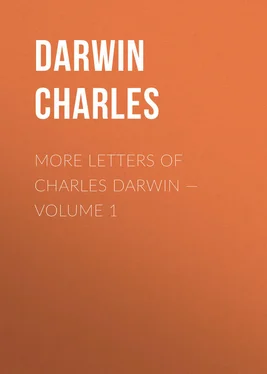Charles Darwin - More Letters of Charles Darwin — Volume 1
Здесь есть возможность читать онлайн «Charles Darwin - More Letters of Charles Darwin — Volume 1» — ознакомительный отрывок электронной книги совершенно бесплатно, а после прочтения отрывка купить полную версию. В некоторых случаях можно слушать аудио, скачать через торрент в формате fb2 и присутствует краткое содержание. Жанр: foreign_antique, foreign_prose, на английском языке. Описание произведения, (предисловие) а так же отзывы посетителей доступны на портале библиотеки ЛибКат.
- Название:More Letters of Charles Darwin — Volume 1
- Автор:
- Жанр:
- Год:неизвестен
- ISBN:нет данных
- Рейтинг книги:4 / 5. Голосов: 1
-
Избранное:Добавить в избранное
- Отзывы:
-
Ваша оценка:
- 80
- 1
- 2
- 3
- 4
- 5
More Letters of Charles Darwin — Volume 1: краткое содержание, описание и аннотация
Предлагаем к чтению аннотацию, описание, краткое содержание или предисловие (зависит от того, что написал сам автор книги «More Letters of Charles Darwin — Volume 1»). Если вы не нашли необходимую информацию о книге — напишите в комментариях, мы постараемся отыскать её.
More Letters of Charles Darwin — Volume 1 — читать онлайн ознакомительный отрывок
Ниже представлен текст книги, разбитый по страницам. Система сохранения места последней прочитанной страницы, позволяет с удобством читать онлайн бесплатно книгу «More Letters of Charles Darwin — Volume 1», без необходимости каждый раз заново искать на чём Вы остановились. Поставьте закладку, и сможете в любой момент перейти на страницу, на которой закончили чтение.
Интервал:
Закладка:
LETTER 45. TO J.D. HOOKER. Down, May 9th {1856}.
...With respect to Huxley, I was on the point of speaking to Crawford and Strezlecki (who will be on Committee of the Athenaeum) when I bethought me of how Owen would look and what he would say. Cannot you fancy him, with slow and gentle voice, asking "Will Mr. Crawford tell me what Mr. Huxley has done, deserving this honour; I only know that he differs from, and disputes the authority of Cuvier, Ehrenberg, and Agassiz as of no weight at all." And when I began to tell Mr. Crawford what to say, I was puzzled, and could refer him only to some excellent papers in the "Phil. Trans." for which the medal had been awarded. But I doubt, with an opposing faction, whether this would be considered enough, for I believe real scientific merit is not thought enough, without the person is generally well known. Now I want to hear what you deliberately think on this head: it would be bad to get him proposed and then rejected; and Owen is very powerful.
LETTER 46. TO J.D. HOOKER. Down {1856}.
I have got the Lectures, and have read them. (46/1. The reference is presumably to the Royal Institution Lectures given in 1854-56. Those which we have seen — namely, those reprinted in the "Scientific Memoirs," Volume I. — "On the Common Plan of Animal Form," page 281; "On certain Zoological Arguments, etc." page 300; "On Natural History as Knowledge, Discipline, and Power," page 305, do not seem to us to contain anything likely to offend; but Falconer's attack in the "Ann. and Mag. of Nat. Hist." June 1856, on the last-named lecture, shows strong feeling. A reply by Mr. Huxley appeared in the July number of the same Journal. The most heretical discussion from a modern standpoint is at page 311, where he asks how it is conceivable that the bright colours of butterflies and shells or the elegant forms of Foraminifera can possibly be of service to their possessors; and it is this which especially struck Darwin, judging by the pencil notes on his copy of the Lecture.) Though I believe, as far as my knowledge goes, that Huxley is right, yet I think his tone very much too vehement, and I have ventured to say so in a note to Huxley. I had not thought of these lectures in relation to the Athenaeum (46/2. Mr. Huxley was in 1858 elected to the Athenaeum Club under Rule 2, which provides for the annual election of "a certain number of persons of distinguished eminence in science, literature, or the arts, or for public services."), but I am inclined quite to agree with you, and that we had better pause before anything is said...(N.B. I found Falconer very indignant at the manner in which Huxley treated Cuvier in his Royal Institution lectures; and I have gently told Huxley so.) I think we had better do nothing: to try in earnest to get a great naturalist into the Athenaeum and fail, is far worse than doing nothing.
How strange, funny, and disgraceful that nearly all (Faraday and Sir J. Herschel at least exceptions) our great men are in quarrels in couplets; it never struck me before...
LETTER 47. C. LYELL TO CHARLES DARWIN.
(47/1. In the "Life and Letters," II., page 72, is given a letter (June 16th, 1856) to Lyell, in which Darwin exhales his indignation over the "extensionists" who created continents ad libitum to suit the convenience of their theories. On page 74 a fuller statement of his views is given in a letter dated June 25th. We have not seen Lyell's reply to this, but his reply to Darwin's letter of June 16th is extant, and is here printed for the first time.)
53, Harley Street, London, June 17th, 1856.
I wonder you did not also mention D. Sharpe's paper (47/2. "On the Last Elevation of the Alps, etc." ("Quart. Journ. Geol. Soc." Volume XII., 1856, page 102.), just published, by which the Alps were submerged as far as 9,000 feet of their present elevation above the sea in the Glacial period and then since uplifted again. Without admitting this, you would probably convey the alpine boulders to the Jura by marine currents, and if so, make the Alps and Jura islands in the glacial sea. And would not the Glacial theory, as now very generally understood, immerse as much of Europe as I did in my original map of Europe, when I simply expressed all the area which at some time or other had been under water since the commencement of the Eocene period? I almost suspect the glacial submergence would exceed it.
But would not this be a measure of the movement in every other area, northern (arctic), antarctic, or tropical, during an equal period — oceanic or continental? For the conversion of sea into land would always equal the turning of much land into sea.
But all this would be done in a fraction of the Pliocene period; the Glacial shells are barely 1 per cent. extinct species. Multiply this by the older Pliocene and Miocene epochs.
You also forget an author who, by means of atolls, contrived to submerge archipelagoes (or continents?), the mountains of which must originally have differed from each other in height 8,000 (or 10,000?) feet, so that they all just rose to the surface at one level, or their sites are marked by buoys of coral. I could never feel sure whether he meant this tremendous catastrophe, all brought about by what Sedgwick called "Lyell's niggling operations," to have been effected during the era of existing species of corals. Perhaps you can tell me, for I am really curious to know...(47/3. The author referred to is of course Darwin.)
Now, although there is nothing in my works to warrant the building up of continents in the Atlantic and Pacific even since the Eocene period, yet, as some of the rocks in the central Alps are in part Eocene, I begin to think that all continents and oceans may be chiefly, if not all, post-Eocene, and Dana's "Atlantic Ocean" of the Lower Silurian is childish (see the Anniversary Address, 1856). (47/4. Probably Dana's Anniversary Address to the "American Association for the Advancement of Science," published in the "Proceedings" 1856.) But how far you are at liberty to call up continents from "the vasty deep" as often as you want to convey a Helix from the United States to Europe in Miocene or Pliocene periods is a question; for the ocean is getting deeper of late, and Haughton says the mean depth is eleven miles! by his late paper on tides. (47/5. "On the Depth of the Sea deducible from Tidal Observations" ("Proc. Irish Acad." Volume VI., page 354, 1853-54).) I shall be surprised if this turns out true by soundings.
I thought your mind was expanding so much in regard to time that you would have been going ahead in regard to the possibility of mountain-chains being created in a fraction of the period required to convert a swan into a goose, or vice versa. Nine feet did the Rimutaka chain of New Zealand gain in height in January, 1855, and a great earthquake has occurred in New Zealand every seven years for half a century nearly. The "Washingtonia" (Californian conifer) (47/6. Washingtonia, or Wellingtonia, better known as Sequoia. Asa Gray, writing in 1872, states his belief that "no Sequoia now alive can sensibly antedate the Christian era" ("Scientific Papers," II., page 144).) lately exhibited was four thousand years old, so that one individual might see a chain of hills rise, and rise with it, much {more} a species — and those islands which J. Hooker describes as covered with New Zealand plants three hundred (?) miles to the N.E. (?) of New Zealand may have been separated from the mainland two or three or four generations of Washingtonia ago.
If the identity of the land-shells of all the hundreds of British Isles be owing to their having been united since the Glacial period, and the discordance, almost total, of the shells of Porto Santo and Madeira be owing to their having been separated {during} all the newer and possibly older Pliocene periods, then it gives us a conception of time which will aid you much in your conversion of species, if immensity of time will do all you require; for the Glacial period is thus shown, as we might have anticipated, to be contemptible in duration or in distance from us, as compared to the older Pliocene, let alone the Miocene, when our contemporary species were, though in a minority, already beginning to flourish.
Читать дальшеИнтервал:
Закладка:
Похожие книги на «More Letters of Charles Darwin — Volume 1»
Представляем Вашему вниманию похожие книги на «More Letters of Charles Darwin — Volume 1» списком для выбора. Мы отобрали схожую по названию и смыслу литературу в надежде предоставить читателям больше вариантов отыскать новые, интересные, ещё непрочитанные произведения.
Обсуждение, отзывы о книге «More Letters of Charles Darwin — Volume 1» и просто собственные мнения читателей. Оставьте ваши комментарии, напишите, что Вы думаете о произведении, его смысле или главных героях. Укажите что конкретно понравилось, а что нет, и почему Вы так считаете.












